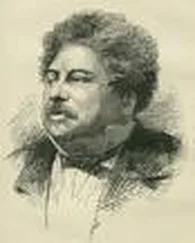Alexandre Dumas - Louise de la Valliere
Здесь есть возможность читать онлайн «Alexandre Dumas - Louise de la Valliere» — ознакомительный отрывок электронной книги совершенно бесплатно, а после прочтения отрывка купить полную версию. В некоторых случаях можно слушать аудио, скачать через торрент в формате fb2 и присутствует краткое содержание. Жанр: literature_19, foreign_antique, foreign_prose, на английском языке. Описание произведения, (предисловие) а так же отзывы посетителей доступны на портале библиотеки ЛибКат.
- Название:Louise de la Valliere
- Автор:
- Жанр:
- Год:неизвестен
- ISBN:нет данных
- Рейтинг книги:5 / 5. Голосов: 1
-
Избранное:Добавить в избранное
- Отзывы:
-
Ваша оценка:
- 100
- 1
- 2
- 3
- 4
- 5
Louise de la Valliere: краткое содержание, описание и аннотация
Предлагаем к чтению аннотацию, описание, краткое содержание или предисловие (зависит от того, что написал сам автор книги «Louise de la Valliere»). Если вы не нашли необходимую информацию о книге — напишите в комментариях, мы постараемся отыскать её.
Louise de la Valliere — читать онлайн ознакомительный отрывок
Ниже представлен текст книги, разбитый по страницам. Система сохранения места последней прочитанной страницы, позволяет с удобством читать онлайн бесплатно книгу «Louise de la Valliere», без необходимости каждый раз заново искать на чём Вы остановились. Поставьте закладку, и сможете в любой момент перейти на страницу, на которой закончили чтение.
Интервал:
Закладка:
“Name it, oh! name it,” said De Guiche.
“I am a woman,” she said, in a voice lower than ever, “and I love.” He rose, she opened her arms, and their lips met. A footstep was heard behind the tapestry, and Mademoiselle de Montalais appeared.
“What do you want?” said Madame.
“M. de Guiche is wanted,” replied Montalais, who was just in time to see the agitation of the actors of these four characters; for De Guiche had consistently carried out his part with heroism.
Chapter XI. Montalais and Malicorne
Montalais was right. M. de Guiche, thus summoned in every direction, was very much exposed, from such a multiplication of business, to the risk of not attending to any. It so happened that, considering the awkwardness of the interruption, Madame, notwithstanding her wounded pride, and secret anger, could not, for the moment at least, reproach Montalais for having violated, in so bold a manner, the semi-royal order with which she had been dismissed on De Guiche’s entrance. De Guiche, also, lost his presence of mind, or, it would be more correct to say, had already lost it, before Montalais’s arrival, for, scarcely had he heard the young girl’s voice, than, without taking leave of Madame, as the most ordinary politeness required, even between persons equal in rank and station, he fled from her presence, his heart tumultuously throbbing, and his brain on fire, leaving the princess with one hand raised, as though to bid him adieu. Montalais was at no loss, therefore, to perceive the agitation of the two lovers – the one who fled was agitated, and the one who remained was equally so.
“Well,” murmured the young girl, as she glanced inquisitively round her, “this time, at least, I think I know as much as the most curious woman could possibly wish to know.” Madame felt so embarrassed by this inquisitorial look, that, as if she heard Montalais’s muttered side remark, she did not speak a word to her maid of honor, but, casting down her eyes, retired at once to her bedroom. Montalais, observing this, stood listening for a moment, and then heard Madame lock and bolt her door. By this she knew that the rest of the evening was at her own disposal; and making, behind the door which had just been closed, a gesture which indicated but little real respect for the princess, she went down the staircase in search of Malicorne, who was very busily engaged at that moment in watching a courier, who, covered with dust, had just left the Comte de Guiche’s apartments. Montalais knew that Malicorne was engaged in a matter of some importance; she therefore allowed him to look and stretch out his neck as much as he pleased; and it was only when Malicorne had resumed his natural position, that she touched him on the shoulder. “Well,” said Montalais, “what is the latest intelligence you have?”
“M. de Guiche is in love with Madame.”
“Fine news, truly! I know something more recent than that.”
“Well, what do you know?”
“That Madame is in love with M. de Guiche.”
“The one is the consequence of the other.”
“Not always, my good monsieur.”
“Is that remark intended for me?”
“Present company always excepted.”
“Thank you,” said Malicorne. “Well, and in the other direction, what is stirring?”
“The king wished, this evening, after the lottery, to see Mademoiselle de la Valliere.”
“Well, and he has seen her?”
“No, indeed!”
“What do you mean by that?”
“The door was shut and locked.”
“So that – ”
“So that the king was obliged to go back again, looking very sheepish, like a thief who has forgotten his crowbar.”
“Good.”
“And in the third place?” inquired Montalais.
“The courier who has just arrived for De Guiche came from M. de Bragelonne.”
“Excellent,” said Montalais, clapping her hands together.
“Why so?”
“Because we have work to do. If we get weary now, something unlucky will be sure to happen.”
“We must divide the work, then,” said Malicorne, “in order to avoid confusion.”
“Nothing easier,” replied Montalais. “Three intrigues, carefully nursed, and carefully encouraged, will produce, one with another, and taking a low average, three love letters a day.”
“Oh!” exclaimed Malicorne, shrugging his shoulders, “you cannot mean what you say, darling; three letters a day, that may do for sentimental common people. A musketeer on duty, a young girl in a convent, may exchange letters with their lovers once a day, perhaps, from the top of a ladder, or through a hole in the wall. A letter contains all the poetry their poor little hearts have to boast of. But the cases we have in hand require to be dealt with very differently.”
“Well, finish,” said Montalais, out of patience with him. “Some one may come.”
“Finish! Why, I am only at the beginning. I have still three points as yet untouched.”
“Upon my word, he will be the death of me, with his Flemish indifference,” exclaimed Montalais.
“And you will drive me mad with your Italian vivacity. I was going to say that our lovers here will be writing volumes to each other. But what are you driving at?”
“At this. Not one of our lady correspondents will be able to keep the letters they may receive.”
“Very likely.”
“M. de Guiche will not be able to keep his either.”
“That is probable.”
“Very well, then; I will take care of all that.”
“That is the very thing that is impossible,” said Malicorne.
“Why so?”
“Because you are not your own mistress; your room is as much La Valliere’s as yours; and there are certain persons who will think nothing of visiting and searching a maid of honor’s room; so that I am terribly afraid of the queen, who is as jealous as a Spaniard; of the queen-mother, who is as jealous as a couple of Spaniards; and, last of all, of Madame herself, who has jealousy enough for ten Spaniards.”
“You forgot some one else.”
“Who?”
“Monsieur.”
“I was only speaking of the women. Let us add them up, then: we will call Monsieur, No. 1.”
“De Guiche?”
“No. 2.”
“The Vicomte de Bragelonne?”
“No. 3.”
“And the king, the king?”
“No. 4. Of course the king, who not only will be more jealous, but more powerful than all the rest put together. Ah, my dear!”
“Well?”
“Into what a wasp’s nest you have thrust yourself!”
“And as yet not quite far enough, if you will follow me into it.”
“Most certainly I will follow you where you like. Yet – ”
“Well, yet – ”
“While we have time, I think it will be prudent to turn back.”
“But I, on the contrary, think the wisest course to take is to put ourselves at once at the head of all these intrigues.”
“You will never be able to do it.”
“With you, I could superintend ten of them. I am in my element, you must know. I was born to live at the court, as the salamander is made to live in the fire.”
“Your comparison does not reassure me in the slightest degree in the world, my dear Montalais. I have heard it said, and by learned men too, that, in the first place, there are no salamanders at all, and that, if there had been any, they would have been infallibly baked or roasted on leaving the fire.”
“Your learned men may be very wise as far as salamanders are concerned, but they would never tell you what I can tell you; namely, that Aure de Montalais is destined, before a month is over, to become the first diplomatist in the court of France.”
“Be it so, but on condition that I shall be the second.”
“Agreed; an offensive and defensive alliance, of course.”
Читать дальшеИнтервал:
Закладка:
Похожие книги на «Louise de la Valliere»
Представляем Вашему вниманию похожие книги на «Louise de la Valliere» списком для выбора. Мы отобрали схожую по названию и смыслу литературу в надежде предоставить читателям больше вариантов отыскать новые, интересные, ещё непрочитанные произведения.
Обсуждение, отзывы о книге «Louise de la Valliere» и просто собственные мнения читателей. Оставьте ваши комментарии, напишите, что Вы думаете о произведении, его смысле или главных героях. Укажите что конкретно понравилось, а что нет, и почему Вы так считаете.












